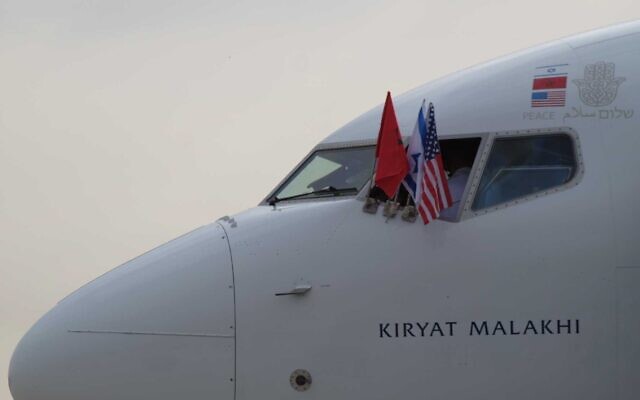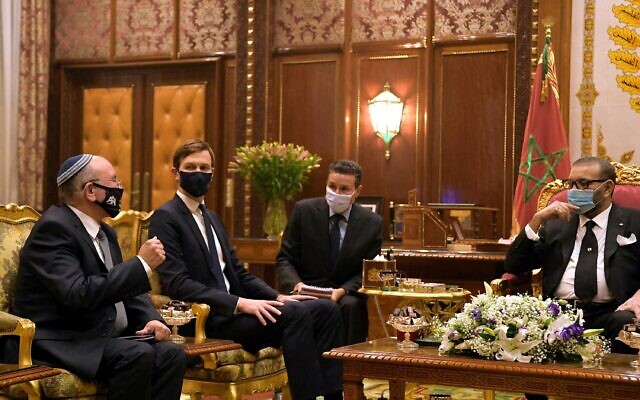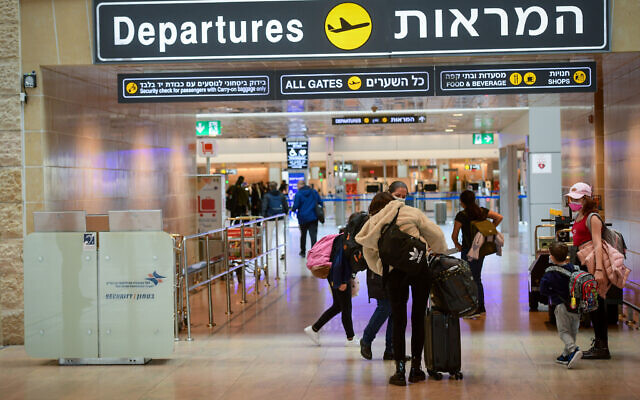Ministers set to approve the establishment of ties with Rabat; separately, Netanyahu pushing to halt flights for 2 weeks to prevent import of coronavirus mutations

The cabinet on Sunday was set to convene, with ministers slated to approve the establishment of diplomatic ties between Israel and Morocco and debate a proposal to suspend all passenger flights to and from Israel for two weeks due to growing fears over more infectious coronavirus variants.
Also on the agenda for Sunday’s cabinet meeting was the approval of Katy Perry as the permanent Israel Prisons Service commissioner.
Morocco was the third Arab state last year to normalize ties with Israel under US-brokered deals, joining the United Arab Emirates and Bahrain. Sudan has also announced plans to normalize ties with Israel, though no official agreements have been signed. In return for the agreement, the US president fulfilled a decades-old goal of Morocco by backing its contested sovereignty in Western Sahara.
Once the cabinet signs off on the normalization agreement, the Knesset will vote on the treaty. The previous normalization deals were unanimously approved by the cabinet, while in parliament, all but the Arab lawmakers backed the pacts.

Sunday’s cabinet meeting will also focus on a proposal to halt flights to and from Israel, with health officials sounding the alarm on the coronavirus variants that have emerged in Britain, South Africa and Brazil and are rapidly spreading worldwide.
The more infectious British variant has spread widely in Israel, with experts predicting it could become the dominant strain within weeks. Israel has also seen over 20 cases of the South African variant, and is carefully monitoring for the Brazilian strain, amid fears one of the mutations will prove resistant to the vaccines.
Prime Minister Benjamin Netanyahu held a meeting Saturday night with officials from the Health Ministry, the Transportation Ministry, the National Security Council, and the Civil Aviation Authority where an initial agreement was reached to essentially halt almost all flights “to prevent the entry into Israel of additional coronavirus mutations,” according to a statement by the Prime Minister’s Office.

The agreement to be presented to the cabinet includes banning all incoming and outgoing flights, restricting arrival to Ben Gurion International Airport, and formulating a separate plan to allow special flights for humanitarian purposes.
People needing to travel may be allowed to do so “in exceptional circumstances” that would require the approval of a committee headed by the directors-general of the health and transportation ministries, according to the PMO announcement.
The statement said the restrictions will come into force once approved by the government, though it was not immediately clear if a majority of ministers will back them.
The travel ban is set to apply to everyone, when those fully vaccinated, according to an earlier report by Channel 12 news on Saturday. Some Health Ministry officials are suggesting the airport only reopen fully when at least 5 million Israelis have been vaccinated, according to the report, a scenario that may be reached by early March.
Channel 13 reported that the Health Ministry is asking the government to approve the use of advanced surveillance tools to track Israelis returning from overseas meanwhile.
Israel is in the midst of a third nationwide lockdown as it seeks to curb COVID-19 infections while closely watching mutated strains and undertaking a massive vaccination campaign.

The country has taken a number of additional steps in recent days aimed at curbing the infections, including raising fines on rule-breakers and increasing limitations on international flights still allowed in.
Starting on Sunday, arrivals from abroad will not be allowed into the country without a negative COVID-19 test carried out within 72 hours of their flight, Channel 13 reported earlier Saturday. Currently, travelers are not obligated to be tested when flying in, though they are required to quarantine for 14 days upon arrival. Travelers presently have the option of being tested at the airport after landing to shorten their quarantine time to 10 days.
Airlines flying into Ben Gurion Airport have been notified not to allow passengers onto flights to Israel if they do not have valid negative tests in hand, the report said.
The government is also expected to approve raising fines Monday on those who defy health regulations: The fine for businesses that open against the rules will double from NIS 5,000 ($1,500) to NIS 10,000 ($3,000). The fines for educational institutions that open illegally and weddings and parties held against the rules will be set at NIS 20,000 ($6,000), the Channel 13 report said.
As reported by The Times of Israel
